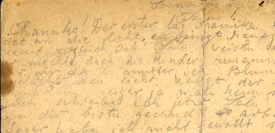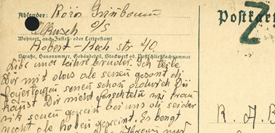Jewish Holidays
 “Chanukah! … Our dear father kindles the lights.
“Chanukah! … Our dear father kindles the lights.
He’s
singing “Ha-neros halolu” while crying all the time.”
In many of their letters, Raizel and Sala’s friends mark
the passage of time through references to the Jewish holidays,
sustaining a sense of family, faith, and future, despite the
depredation of the war. In one letter, Raizel anticipates the
holiday of Purim
in March, and ends with a plan for Passover in April. Even
under duress, certain expectations were sustained; when Sala
returned to Geppersdorf
after her “vacation” in
Sosnowitz, Raizel conveyed their parents’ request for her
to fast on Yom Kippur. Holidays had always been joyous gatherings,
but they had now become sad reminders of what had been lost,
reflecting the emotional toll of occupation. In 1941, Raizel
wrote: “The
first day of Chanukah. Our dear father kindles the lights,
[and] he’s singing ‘Ha-neros halolu’ while crying
all the time.”

Raizel assured Sala that she ate no bread during Passover and
lamented the perversion of a holiday that had become more a day
of fasting than feasting, when empty chairs represented missing
family. She wrote: “My heart is bleeding, because we didn’t
send you any matzohs. Can you believe this? It’s the night
before the holiday, and there are no matzohs, no nothing.” Sala’s
cousin Rozia Grünbaum wrote that during the family Seder
(Passover meal) “We cried so much, our tears could have
filled a lake.”
 “The holidays are already over and
you can’t
imagine
“The holidays are already over and
you can’t
imagine
how sad our seder night was and we all cried.”Within the sadness, Raizel, Rozia, and others tried to end their
letters on positive notes. Rozia reassured Sala that “Everything
is okay with us” and “We will be happy together again.” Even
after the saddest of narratives, Raizel could write, “Remember,
don’t worry about us. Sala, have a good time!” And
for Passover 1942, she exhorted Sala to “Laugh as much as
you can get away with!” Raizel wrote from the Neusalz labor
camp that for Passover 1943 the women had a Seder until two in
the morning!
View section images